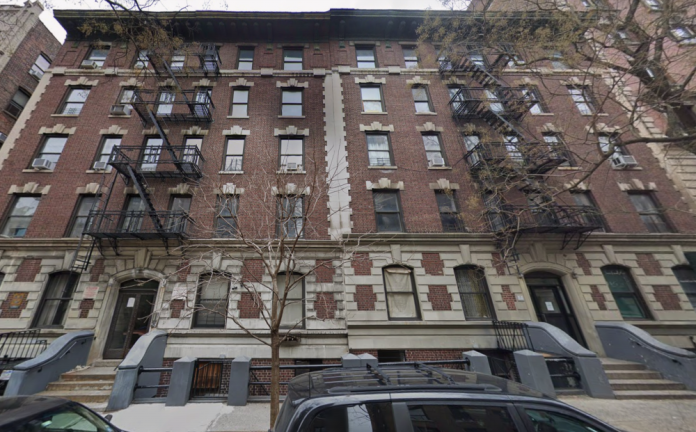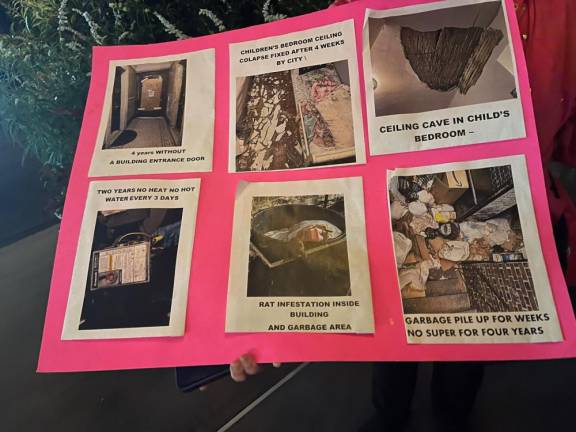NYC’s ‘Worst Landlord’ is in Jail. What Led Up to His Arrest?
Notorious landlord Daniel Ohebshalom is serving time on Rikers Island, after failing to heed court orders to fix hazardous conditions in two of his rental properties. Complaints against him date back two decades.


Daniel Ohebshalom is currently serving a 60-day jail sentence on Rikers Island after turning himself in to New York City authorities on March 21. That’s nearly two weeks after a housing court judge first issued a warrant for the notorious landlord’s arrest and over two decades after his tenants first began raising the alarm about hazardous conditions in his rental properties.
Ohebshalom, who also goes by Dan Shalom, is the owner of two Washington Heights apartment buildings: 705 and 709 W. 170th St. Tenants there have at times lived without heat, hot water, and electricity, and contended with leaks, mold, chipped lead paint and roach and rodent infestations, according to Department of Buildings records and court affidavits.
Data from the Department of Housing Preservation and Development show that there are over 700 open violations between the two buildings.
The arrest is a notable chapter in a legal saga that began in September 2021, when HPD first began litigation against the Washington Heights buildings for failing to address the numerous open violations.
Ohebshalom, his company Belmont Ventures LLC, and building managers Gustavo Santana and Robin Ignico were eventually all named as respondents. (Their attorney, Vladimir Mironenko, did not respond to phone and email requests for comment.)
Over the last two years, two separate judges issued multiple orders for the buildings’ owners to correct the violations. When they failed to do so, they were found in civil and criminal contempt—first in February 2023 and then again in July, according to court records.
“It is an injustice to allow this landlord to continue to refuse meaningful repairs to the building that he is legally required to make while facing no accountability at all, at the same time that I face hazardous conditions posing a risk to my safety each day,” said Ana Aguiscia, a tenant of one of the Washington Heights buildings, in a February court statement.
On March 8, Judge Stoller issued an arrest warrant for Ohebshalom. In the warrant, the judge called the 13-month duration of the contempt proceedings “striking.” “The sheer volume of extant hazardous and immediately hazardous violations bespeaks the extent of Respondents’ contempt,” he wrote.
Ohebshalom was believed to be living in California, and local officers worked with authorities in Los Angeles County to locate him. Before he surrendered in New York, he remained free for nearly two weeks while his attorney filed and lost a motion to have the warrant vacated.
The decades-long history of the ‘worst landlord’
Ohebshalom has a reputation. The city’s public advocate has named him the city’s “worst landlord” for two years in a row. And news reports about him date back at least 15 years. “It was inhuman the way he was doing everything,” one of his former tenants told the Queens Chronicle in 2008. “They don’t want to deal with anybody, with no reasons, no explanations, nothing.”
In 2003, some of his tenants helped establish the Shalom Tenants’ Alliance, a coalition to fight what they described as the “Shaloms’ relentless anti-tenant practices.” The group, which said it included residents of over 100 buildings in 2006, mapped out the rental portfolios of Ohebshalom and other members of his family. Several of his relatives have their own property management companies, and some have also faced city lawsuits for property neglect.
Peter Griffin was involved in the coalition’s early organizing efforts. He lives in an East Village building, 331 E. 14th St., where Ohebshalom was his landlord for nearly 20 years. There, conditions worsened over the pandemic: rodent infestations, human feces in the halls, squatters, and collapsed ceilings went unaddressed, tenants said. Last spring, the building was listed in a foreclosure sale, and a new management company has since taken over. Repairs have been slow, but things are still “light years better” than they were under Ohebshalom’s management, said Griffin.
Ohebshalom’s notoriety reached new heights last year, when the City announced that Ohebshalom had been hit with $4.2 million in fines for operating illegal short-term rentals and maintaining deplorable conditions across several of his properties, including one in Hell’s Kitchen and the Washington Heights rentals. Conditions in his Hell’s Kitchen property had become so dangerous that HPD appointed a city administrator to take over management of that building and barred Ohebshalom and his associates from entering or collecting rent on the property.
While Ohebshalom was still at large, Straus News asked Griffin for his thoughts on the arrest warrant. He responded, “I’m a photographer. I just keep visualizing the mugshot.”
A symptom of systemic flaws
Sateesh Nori, a tenant lawyer at the Legal Aid Society, told Straus News that during his 20 years in housing court, he has only seen a judge issue an arrest warrant for a landlord three or four times.
“It’s extremely rare,” Nori said in a phone call. “Housing court judges have this huge power to make sure that people are living in safe apartments, and they should use it more, because it may indeed have a deterrent effect.”
Officials have emphasized that Ohebshalom’s arrest should serve as a warning to landlords. In a statement, Deputy Mayor for Housing, Economic Development and Workforce Maria Torres-Springer called it “an important lesson to anyone who allows unacceptable housing conditions to persist.”
But, Nori emphasized, more should be done to prevent unacceptable housing conditions from developing in the first place. “We shouldn’t have a system where there’s no training or licensing or background checks for people who operate buildings in which hundreds and hundreds of people are living,” he said.
For landlords who have big rental portfolios and “hide behind LLCs,” he argued, there should be better ways to track their bad practices. (Nori was previously the executive director of JustFix, a housing justice nonprofit that provides a tool to trace a landlord’s portfolio.)
Though the law may compel landlords to correct violations, it cannot undo the physical, mental, and monetary costs tenants have already borne. “How many people gave up, moved out, or suffered for all those years?” asked Nori.
The day Ohebshalom turned himself in, Straus News reached out to Griffin to ask how he felt.
“So, feelings are mixed,” he said in a text message. Unlike his East Village building, the Washington Heights buildings are still under the same management, he explained. “Tenants there are still in Shalom hell.”